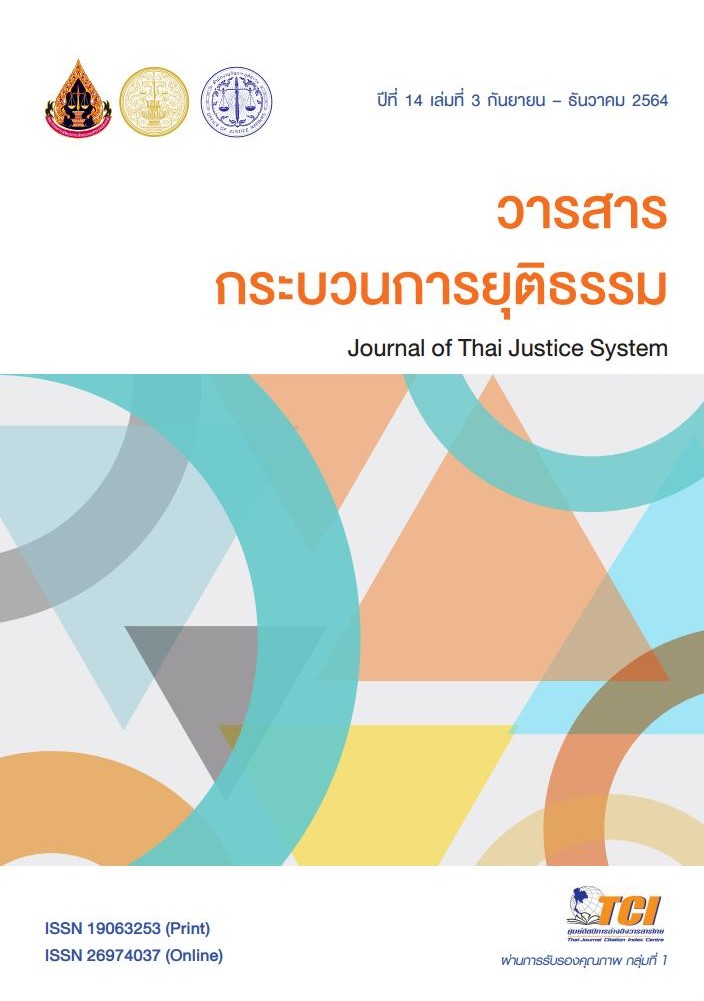การพัฒนาระบบสร้างความร่วมมือ การป้องกันเชิงรุกและบรรเทาข้อขัดแย้งในการใช้ทรัพยากรร่วมกันจากการพัฒนาเศรษฐกิจและสังคม
Main Article Content
บทคัดย่อ
บทความวิจัยนี้ มีวัตถุประสงค์เพื่อศึกษาปัญหาความขัดแย้งในการใช้ทรัพยากรร่วมกัน จากการพัฒนาเศรษฐกิจและสังคม เพื่อให้เกิดความเข้าใจปัญหาในเชิงลึกและสามารถพัฒนากลไกต้นแบบในการจัดการปัญหาความขัดแย้งแต่ละรูปแบบได้อย่างเหมาะสม ตลอดจนเพื่อได้ข้อเสนอแนะเชิงนโยบายและข้อเสนอแนะในการแก้ไขกฎหมายที่จำเป็นต่อการผลักดันการพัฒนา กลไกการจัดการความขัดแย้งที่เหมาะสมและยั่งยืน การศึกษานั้นใช้วิธีการเก็บข้อมูลจากสถิติรับเรื่องร้องเรียนจากศูนย์บริการภาครัฐ และการจัดประชุมกลุ่มย่อย (Focus Group) กับหน่วยงานภาครัฐที่เกี่ยวข้อง เพื่อให้ได้ประเด็นปัญหาความขัดแย้งที่เกิดขึ้นบ่อยครั้งหรือเป็นปัญหาที่มีผลกระทบต่อคนจำนวนมาก จากนั้นจึงทำการเลือกกรณีศึกษามา 10 กรณีเพื่อมาทำการศึกษาเชิงลึกและพัฒนากลไกต้นแบบในการจัดการความขัดแย้ง
ผลการศึกษาพบว่าปัญหาความขัดแย้งที่เกิดขึ้นบ่อยครั้งหรือปัญหาที่มีผู้ได้รับผลกระทบจำนวนมากนั้น ประกอบไปด้วย ปัญหาที่ดินทำกินของประชาชน การรั่วไหลของสารพิษและการก่อมลพิษอุตสาหกรรมต่อชุมชน ความขัดแย้งจากการไล่รื้อที่ดินคนยากจน ความขัดแย้งด้านประมง การคัดค้านโครงการพัฒนาของรัฐขนาดใหญ่ การไล่รื้อที่ดินคนยากจน และการจัดการทรัพยากรน้ำ ซึ่งจากการลงไปศึกษากรณีศึกษาที่เกี่ยวข้องกับประเด็นปัญหาเหล่านี้ก็พบว่า กลไกการจัดการความขัดแย้งของภาครัฐไทยในปัจจุบันยังประสบปัญหาและข้อจำกัดหลายประการ ประกอบด้วย การยึดติดกับกรอบอำนาจหน้าที่ตามกฎหมาย หน่วยงานขาดการบูรณาการในการแก้ปัญหา การขาดการประสานงานร่วมกันระหว่างราชการส่วนกลางและส่วนท้องถิ่น และการขาดการประสานงานระหว่างราชการส่วนกลางกับส่วนภูมิภาค
งานวิจัยนี้ยังได้นำเสนอต้นแบบการแก้ไขปัญหาความขัดแย้งหลายรูปแบบ ประกอบด้วย กลไกเชิงรุกในการส่งเสริมสิทธิชุมชนเพื่อแก้ปัญหาความขัดแย้งจากทรัพยากรประมงและปัญหาที่ดินทำกินบุกรุกพื้นที่อุทยานหรือป่าไม้ กลไกคณะกรรมการกลางที่ไม่ได้มาจากส่วนราชการสำหรับช่วยไกล่เกลี่ยกรณีความขัดแย้งในโครงการพัฒนาขนาดใหญของรัฐ การแก้ปัญหาความขัดแย้งจากขยะมูลฝอยด้วยองค์ความรู้ทางวิทยาศาสตร์ และการแก้ไขปัญหาการไล่รื้อที่ดินคนยากจน ด้วยต้นแบบการจัดสรรที่ดินค้างการขายทอดตลาดเป็นเวลานานของกรมบังคับคดี
Article Details
ต้นฉบับที่ได้รับการตีพิมพ์ในวารสาร เป็นลิขสิทธิ์ของวารสารกระบวนการยุติธรรม แต่ความคิดเห็นที่ปรากฏในเนื้อหาของบทความในวารสารกระบวนการยุติธรรม ถือเป็นความรับผิดชอบของผู้เขียนแต่เพียงผู้เดียว
เอกสารอ้างอิง
กมลินทร์ พินิจภูวดล, กิตติภูมิ เนียมหอม และพันธ์รบ ราชพงศา. (2559). การพัฒนาอย่างยั่งยืน: รายงาน การศึกษาวิจัยฉบับสมบูรณ์. กรุงเทพฯ: สถาบันระหว่างประเทศเพื่อการค้าและการพัฒนา.
ชวนัสถ์ เจนการ. (2562). ขับเคลื่อนการจัดตั้งศูนย์ประสานงานการเสริมสร้างความสามัคคีปรองดองและความ สมานฉันท์. กรุงเทพฯ: สำนักงานศูนย์วิจัยและให้คำปรึกษาแห่งมหาวิทยาลัยธรรมศาสตร์.
หนังสือต่างประเทศ
Bacow, L. S., & Wheeler, M. (1984) Environmental dispute resolution. NY: Springer
Billon, P. L. (2015). Environmental Conflict. In Perreault, T. et al. (eds.). The Routledge Handbook of Political Ecology. NY: Routledge.
Goetz, S. J. et al. (2005). Land use problems and conflicts: Causes, consequences and solutions. Oxon: Routledge.
Hipel, K. W. et al. (2015). Conflict resolution in water resources and environmental management. NY: Springer.
Holifield, R. (2015). Environmental Justice. In Perreault, T. et al. (eds.). The Routledge Handbook of Political Ecology. NY: Routledge.
Kelman, H. C. (2009). ‘A social-psychological approach to conflict analysis and resolution’, in Sandole, S. et al. (eds.). Handbook of Conflict Analysis and Resolution. NY: Routledge.
Schnurr, M. A., & Swatuk, L. A. (2012). Natural resources and social conflict towards critical environmental security. NY: Palgrave Macmillan.
Sidaway, R. (2005). Resolving environmental disputes: From conflict to consensus. LDN: Earthscan.
Vollmer, M., & Grann, H. (1999). Large-scale constructions in coastal environments: Conflict resolution strategies. Heidelberg: Springer.


